Last week was Indigenous Peoples Day and as usual CCBC had a great event to celebrate Indigenous people’s culture. Dr. Kim Jensen organized this virtual event as a part of CCBC’s college-wide Community Book Program. Students and faculty had a chance to listen to the amazing guest speakers, Christy Chapman and Cheryl Demmert Fairbanks. The titles of the two presentations were, “Peacemaking: an Indigenous Journey of Healing and Transformation From Fear” and “We Are the Grandmothers: Peace circles and fear…the Interweave.”
What beautiful and powerful titles, right?
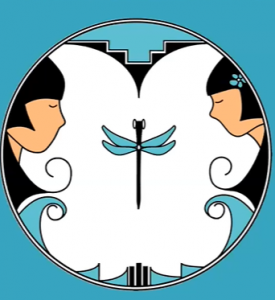
The guest speakers were able to draw a beautiful picture of peace and healing from fear in everyone’s mind. While they were talking about the history of the injustices they endured for generations to come, I got emotional. I connected to the Indigenous peoples on so many levels. Being a Palestinian from Gaza, I know exactly what settler colonialism is and what it does. I know exactly how much pain and destruction it causes to indigenous people. I know exactly what the uprooting from your homeland means and how it feels. While they were describing that, I started to have flashbacks of the stories my grandmother used to tell me about the pain and suffering she, her family, and all the villagers had to go through when they were forced to leave my grandfather’s farmland in their village Braire. This village is my village. It’s my grandfather’s village. It’s my ancestors village. I never got to see Braire, but I have strong faith that one day I will return to my village to my farmland and eat from it’s harvest.
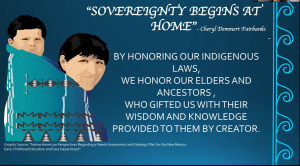
I’m so fascinated by the beautiful and inspirational culture of the Indigenous peoples. The way they use the warmth of their culture to heal from trauma, fear, and injustices they endured for all these years is amazing. The presenters inspired me to learn more about their culture. I can learn a lot about the creative ways Indigenous people helped their own rise and heal from fear. Helping my people in my home country Palestine has been on my mind a lot lately. I have been wondering where to start for the past months, but never thought that help was here all this time at the place I call my second home CCBC. Dr. Kim, thank you from the bottom of my heart for helping me take the first step in my healing journey.
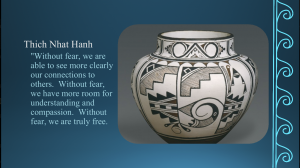
Despite all of the unjust effort to rip the culture out of them, indigenous people found a way to go back to their roots and to their culture for healing and strength. They found warmth, love, healing, and strength together as a whole. That’s why it worked. It’s because the whole indigenous community were one hand, one voice, and one purpose. Not only that, they have so manny allies and the CCBC community is a proud one. I’m so proud to be a member of this diverse and supportive community.
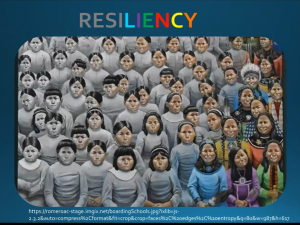
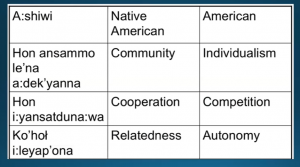
We can’t talk about indigenous people without talking about land acknowledgment. Allow me to share with you the names of the Indigenous peoples whose land in now known as Baltimore. Those people once lived on this land and called it their home. They deserve to be acknowledged. This practice of land acknowledgment I learned from Dr. Patricia Quintero-Hall.
Dr. Patricia, thank you from the bottom of my heart for helping me take the first step in my healing journey.
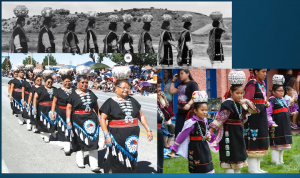
Here is the land acknowledgement:
The Community College of Baltimore County (CCBC) wishes to acknowledge the Indigenous peoples whose homeland is now Baltimore County. The lands upon which these campuses are built were once inhabited by the Accohannock, Accoceek, Assateague, Choptank, Conoy, Lenape, Matapeake, Mattawoman, Nanticoke, Ozine, Patuxent, Piscataway, Powhatan, Susquehannock, and Yaocomico people.
For thousands of years they lived, loved, learned, thrived, cherished, celebrated and died, long before the first European incursion. The Indigenous peoples who once lived in this region suffered from colonization, genocide, and cultural erasure, yet many descendants still remain, often hidden among us.
The Community College of Baltimore County not only recognizes and honors the history and legacy of these peoples; but also the Native communities who have made Baltimore their home, most especially the Lumbee and the Cherokee who have made rich contributions to the region.
CCBC refutes the European Doctrine of Discovery and instead pays homage to the Indigenous people who were here long before any European explorers set sail. CCBC remains dedicated to fostering an educational vision that respects the history, legacy, beliefs, and culture of Maryland’s Native peoples. We are committed to truth-telling, refuting falsehoods from the past and recognizing the Indigenous peoples’ rightful place as true natives of this land.
I hope everyone enjoyed this blog, which is so dear to my heart.
Until next time my friends,
Rama





Thank you Rama for opening our minds…and now our hearts. Please let me know when there is another circle of love on campus ❤️
Thank you Carmen for your kind words. Will let you know for sure ❤️